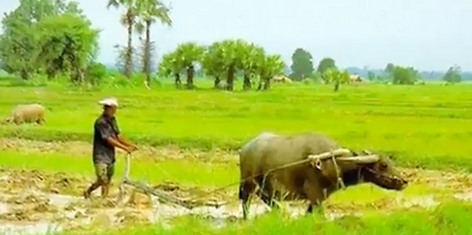
Stop The Burning


Why Help Farmers ?
Modern large-scale commercial farming produces food, but does little to alleviate poverty. The average farm wage is 84.000 baht per annum, compared with the average manual wage in urban areas of 180,000 Baht. The average age of rice farmers is now 51 but 20 years ago the average age was 31. This startling statistic is very telling. The younger generation cannot afford to continue farming. Research suggests that they also find the work too backbreakingly difficult and fear social stigma. So the young seek work in the non farming sector. Burning crop residue is not just the cheapest option, it is the only affordable option - until now.
Do you want to eat ?
It is costly for small-scale farmers to maintain their farms due to high labour costs, soil infertility, low crop yield and high machine rental cost. In recent years there have been more risks to crop yield for example from drought, flooding and a spread of plant insects and diseases. The greenhouse effect too has played a part in this sorry tale. High variations of temperature and unusual rain patterns have caused yield loss creating higher production costs and reducing production return.
Economic Efficiency
There are many economic advantages in farming on a small-scale. Local farmers generate a local economy in their rural communities. An American study showed that small farms with incomes of $100,000 or less spend almost 95 percent of their farm-related expenses within their local communities. The same study took in comparison the fact that farms with incomes greater than $900,000 spend less than 20 percent of their farm-related expenses in the local economy. Thus, small-scale agriculture supports the local economy
Skip Generations
The aging farming population has perpetuated educational problems. Small farmers were not well educated with very few going on to higher education. Their sons and daughters followed in their footsteps and now go to urban areas in search of manual work. This is often low paid. They leave their children with their aging farmer parents because they cannot afford to take or keep them in the urban areas. So the grandchildren are cared for by their grandparents and often do not go to school but work on the farm as free labour - education has a low value in these households and that view is perpetuated from generation to generation. This is known as ‘skip generation’. Old farmers are uneducated. How can they teach their children or their grandchildren ? Where do their children and grandchildren get breathing space to learn ?
Poverty Traps
Borrowing for farmers is particularly problematical. Although small scale loans are available from the Bank of Agriculture, larger loans for machinery investment are not. This is because it takes 10 years in Thailand to seek foreclosure on land whereas normal foreclosure on say a car takes less than 6 months. So Banks are reluctant to lend larger sums to farmers because default doesn't lead to recovery in reasonable time. As a result, the interest rates on such loans are far higher than for normal goods. This is aggravated by their elderly age. Thai farmers have become increasingly indebted, last year owing on average 104,000 baht, or $3,350, the equivalent of about five years of their average income. The reasons are basic survival coupled with the higher interest rates of loan sharks, rising fertilizer prices and the legacy of crops lost to flooding, drought and other natural disasters.
Retirement ?
Farmers work until they cannot work any more. There is no retirement age. No grand pensions for them. As they age they suffer ill health but the monies needed to rest or recuperate are not available. Their sons and daughters and their grandchildren send money home so that they can survive. Very often, the granchildren stay with the grandparents because the parents simply cannot afford to keep them. A vicious circle develops and it is a reproductive poverty trap
Stop The Burning
Now we understand more why farmers resort to burning despite the effects on their own health as well as ours. Thirty or so years ago farmers rarely burnt their crop residue. There was little because their animals - buffalo and cows mostly - ate it. They were kept to pull the ploughs etc. But mechanisation gained favour and the animals were sold to help pay for the tractors etc or were eaten. But that left the crop stubble issue. Scientists said that residue burning was cheap, quick, efficient, killed weeds and pests and that the ash still had some nutrients which would act as fertiliser on the soil. And so the farmers burnt their residue and have done ever since and now contribute hugely to the annual haze, air pollution, damage to health, premature deaths and damage to the local economy.
Long Kek
A fading tradition in Thailand is that of 'long kek' i.e. helping neighbours plant and harvest their crop or even build a barn or home. Our shredders follow 'long kek' principles. They must be shared and because of this, small scale farmers work together and defray costs, achieve economies of scale and achieve increased labour and land productivity.
Shred Instead
The Rotary Shredder provides a solution that can benefit the entire community. It is not a cheap solution, but it is affordable. In tandem with providing farmers with a means to manage and not burn their crop residue, it also provides them with a means to grow their income by using the resultant organic fertiliser and selling the surplus. Moreover, by sharing the shredders and working together costs will be reduced. Additionally, by selling direct to individuals, food stores and restaurants such customers can be certain that the produce is fresh, organic and contains no residues from chemical fertiliser because none will be used. The solution is sustainable, but first it has to be proven. The initial stages will be the most expensive. After that, the shredders should pay for themselves.










